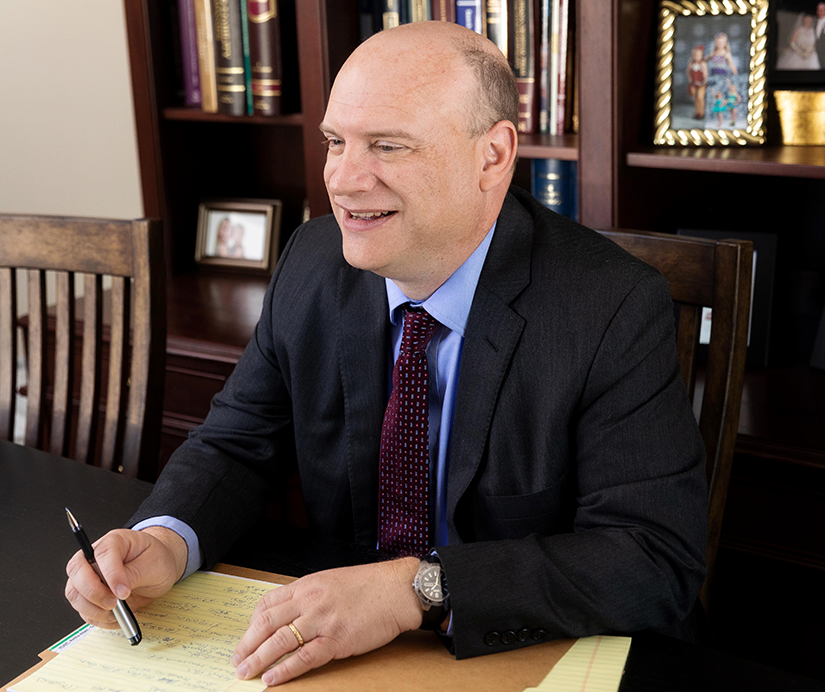Gonzales Successions Lawyer
Gonzales Succession Attorney

Innovative Solutions for Your Legal Concerns
Ascension Parish, Louisiana, Probate Lawyer
When someone you care about passes away, many issues need to be addressed. Funeral arrangements need to be made. Loved ones need to be notified, and the estate needs to go through the probate or succession process.Working with a Gonzales successions lawyer can help you and your family get through this difficult time.
I am attorney Christopher J. Bridges and at my Ascension Parish, Louisiana, law firm, Christopher J. Bridges, Attorney at Law, I offer more than 25 years of experience helping families with all of the issues related to probate. Whether you have recently lost a loved one or you need estate planning guidance, you can count on honest, practical advice. Call 225-319-5541 or contact me online to schedule an appointment with an experienced Louisiana successions lawyer.
What Is A Succession?
Call Christopher J. Bridges, Attorney at Law 225-644-7250
Sometimes known as probate, a succession is the process through which the deceased individual’s estate and/or will is evaluated and the property is distributed accordingly. While these may be simple and straightforward cases, they can become extremely complicated matters.
I can help clients understand issues pertaining to an individual who has died with a will (called testate) or an individual who has died without a will or had a will declared invalid by the court (called intestate) and how these situations are handled.
Reach for confidence and assurance after the death of a family member. Whether or not your loved one had a valid will, my firm can take care of the estate administration so that you do not need to worry. While a succession can be complex, it is often much less expensive than people expect. Additionally, if you need legal counsel regarding a contested probate matter, my litigation experience can protect your interests.
Outlining the Succession Process
Successions generally follow a step-by-step process that is mandated by the state. This process exists to make sure that wills are carried out effectively, that the proper heirs have been named and that the succession rules have been followed. While every situation is different, most successions follow a process similar to this one:
- The succession begins when a Petition for Possession is filed with the district court. This is done after the testator’s death and opens the succession case. The petition is either filed by the executor named in the will, by the surviving spouse, or by the heirs or legatees. It normally includes information about the deceased, their family and their estate.
- Some successions will be very quick and can be finished in a very short time. If all of the heirs are in agreement and there is little or no debt, a Judgment of Possession can be submitted with the initial filing and the case can be finished in a matter of weeks. The heirs will become co-owners of the assets and it will be up to them to decide how to divide the estate between themselves. Other successions may require the appointment of an executor or administrator to oversee the succession process.
- In the case of an administrated succession, the executor or administrator then has to identify what assets the deceased person has. This includes real estate, bank accounts, investments, and other personal property.
- Before any assets can be distributed, the estate’s debts and taxes have to be paid to any creditors. This includes any federal or state tax on income or property as well as any debts, like mortgages or loans. The income generated from selling the estate’s assets is used to settle these financial obligations if there is not enough cash on hand.
- Once all the debts are paid, whatever assets are left are distributed to the heirs or in the case of a will, to the legatees according to the will. If there is no will, the assets are divided according to state law.
- Once debts and assets are paid, the executor or administrator is required to file a Final Accounting in order to detail what happened during his administration of the estate. If there is no objection and the court approves, the estate is then closed.
These steps are performed to make sure that the succession process is done in a legally valid way. Following this routine process can make it easier for the deceased’s beneficiaries to receive their assets and if applicable, for the executor to close out the estate.
Why Do I Need an Attorney?
A succession is a complicated legal proceeding that will have long-lasting effects upon the people and properties involved. It’s important for that process to go as smoothly as possible for the sake of everyone involved. An attorney can bring their understanding of estate law to a succession case for the benefit of their clients. They can explain the legal requirements and procedures involved in the succession to make sure that all the necessary steps are followed correctly. This can prevent common errors that are made in succession, saving time and energy.
Successions also involve a lot of paperwork, including petitions, affidavits and final accounts. An attorney can help prepare as well as file these documents with the court to make sure they are submitted in a timely fashion. With the assistance of an attorney, these documents can be filed correctly the first time to avoid delays and potential legal issues that could come from incorrect or incomplete filings.
Why Do I Need a Succession?
One of the most common questions asked is why is a succession necessary in the first place? In order for any piece of property to be sold or transferred, the owner of the property must be the one to sign. In the event of someone’s death, he or she is obviously no longer able to sign to make such a transfer. A succession is the legal process whereby the proper heirs are identified and recognized by the court. Once this happens, the names of the heirs are substituted for the name of the deceased person. In other words, the heirs are recognized as the owners of the deceased person’s property. This is why a succession is necessary.
Another common question is whether a succession is necessary if there is a will. The answer here too is yes. The will simply sets out the deceased person’s wishes as to who owns what, etc. The succession is still necessary to have the property transferred into the names of the people named in the will, who are called “legatees”.
Does everyone have to have a succession? The answer is no. If the deceased person had no assets, then a succession will usually not be necessary.
Handling The Drafting Of Wills And Other Estate Planning Tasks
In addition to handling all aspects of succession/probate cases, my firm also provides clients with guidance on drafting wills and other estate planning matters. When you come for help, you will not be left to speak with a secretary or assistant. I take the time to meet with your personally, answer your questions and listen to your concerns throughout the estate planning process. Additionally, it is often possible to have your will completed and signed at your initial consultation, without the need for multiple visits.
Contact an Ascension Parish, Louisiana, Probate Attorney for the Advice You Need.
Speak with an experienced lawyer who can provide you with the personal attention and realistic advice you need to protect yourself and your loved ones in Ascension Parish. Call 225-644-7250 or contact me online to schedule an appointment with Christopher J. Bridges, Attorney at Law.
Practice Areas
- Divorce & Family Law
- Succession/Probate Cases
- Succession/Probate Case FAQ
- Wills & Estate Planning
- Other Practice Areas
Contact An Ascension Parish, Louisiana Probate Attorney For The Advice You Need
FAQs
What Is Probate?
In Louisiana, probate is the court-supervised process of establishing the validity of a will. A will must be proven to be valid in Louisiana by submitting a Petition for Probate of Testament. Your succession attorney can prepare this, and the representative can sign it.
The term “Probate” is also be used to refer to the whole succession process, especially in other states. The Probate process in other states can often be an extremely expensive and time-consuming process. This is not necessarily the case in Louisiana. There are usually ways for an experienced succession Louisiana attorney to accomplish the desired result for a Louisiana resident for a fraction of the cost of what the family of someone who died in another state would pay.
How Can a Lawyer Help With a Succession in Louisiana?
A lawyer can help with a succession by providing legal experience and guidance. First, by determining whether an administration will be necessary and then by preparing the necessary documents and lists of assets and debts to insure an orderly transition. They will make sure that the deceased person’s estate is handled according to Louisiana law. The loss of a loved one can be a stressful time. An experienced succession and probate attorney can provide valuable advice and direction at such a trying time. Such times also tend to bring out the best in some, but the worst in others. An attorney can also help you understand your rights and those of your fellow heirs.
What Is the Difference Between Testate and Intestate Succession?
The difference between testate and intestate succession depends on whether the late individual died with a will. Testate succession is when a person dies with a valid will, telling their descendants what assets they have and how they should be distributed. The will must also name an executor, which is a person who is responsible for carrying out the wishes of the deceased. If someone dies without a will or it is invalid, the estate will be handled through intestate succession.
How Are Debts and Taxes Handled During Succession?
The answer here depends upon whether the succession is being administered, meaning an executor or administrator is being appointed, or not. If a succession administrator is appointed, the debts and taxes are handled during succession before the estate is closed. These must be paid before any assets are given to beneficiaries. After the testator’s death, the executor has to identify all debts that have not been paid, including mortgages or credit card bills. The assets from the estate are used to pay these debts to make sure that all the testator’s financial responsibilities have been met before closing the estate. In the event the heirs are put into possession of the estate without an administration, it will be up to the individual heirs to deal with the debts and taxes. These may become the personal responsibility of the heirs so be sure to speak to an experienced succession attorney to avoid these types of pitfalls.
Do you have to have an executor or administrator?
In Louisiana, the answer is no. Most successions are handled without the need for an executor or administrator to be appointed. Generally, you will need an executor or administrator (called an “administrated succession”) when there are a debts owed by the deceased person, when some action needs to be taken on behalf of the estate, when the heirs are minors, incompetent or whose where abouts are unknown or when something is payable to the deceased person or the “Estate of” the deceased person. These are a few examples of why an administrated succession might be necessary. A common need is when an insurance check is made payable to the deceased person and the insurance company refuses to reissue the check any other way. An administrator must be appointed in such a case to open a succession account and deposit the check.
What about a living trust?
You will often see promotions touting the wonders of “living trust” and how they can save you the headache and expense of “probate”. These are creations from outside of Louisiana and do not necessarily solve the same types of problems here that they may in other states. Often, you will spend many times the amount of money setting up a living trust than what it would have cost to prepare a will and have an attorney handle an uncontested succession. This would not even count the time and expense involved in putting assets into and then taking them back out of a trust. Don’t trust the sales pitch! Before undertaking a living trust, be sure to consult with an independent, Louisiana succession attorney to make sure you are not being sold on something you do not need.
Handle Your Loved One’s Estate With Care
Dealing with the loss of a loved one is never easy, and it can be made more difficult with the added burden of managing their estate. Working with an attorney can help you and your family through this challenging time. Schedule a consultation with Christopher J. Bridges, Attorney at Law, to discuss your needs and to make sure your loved one’s wishes are honored.




